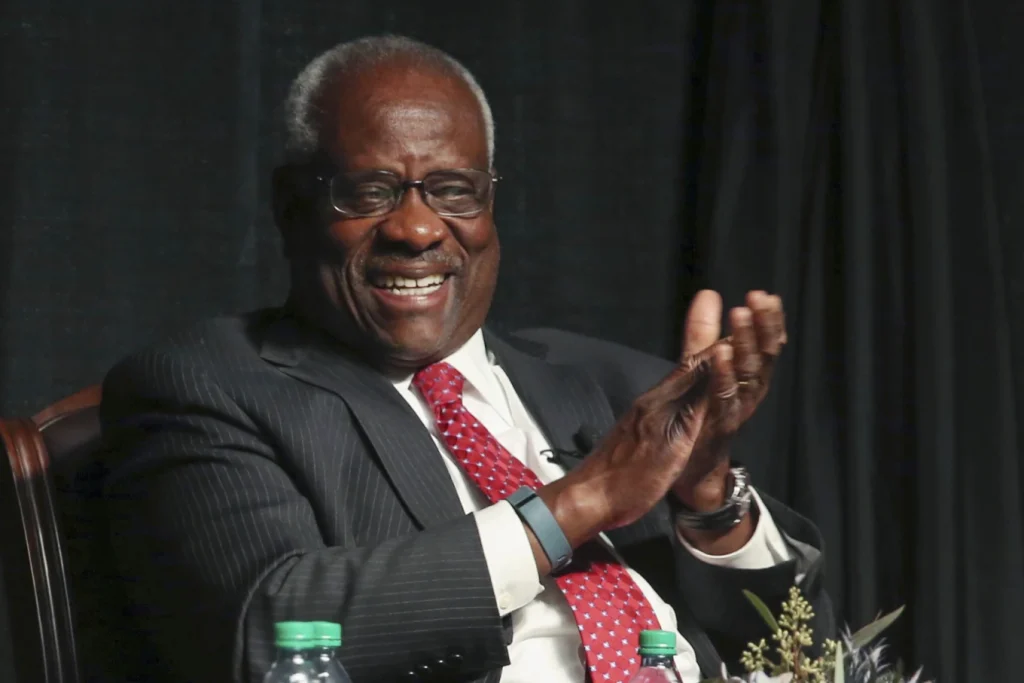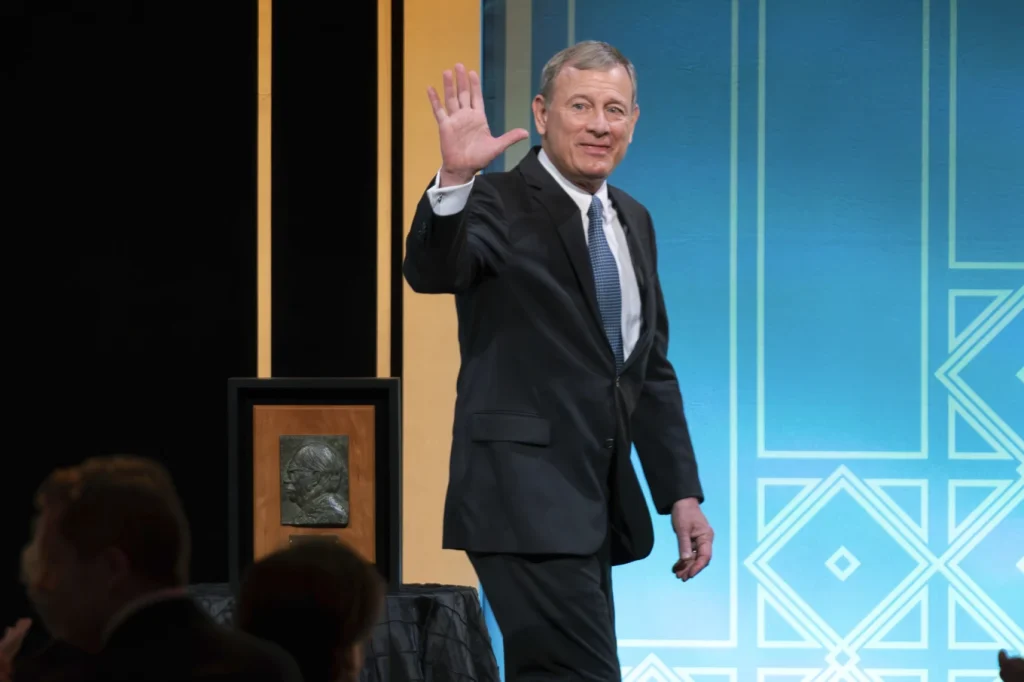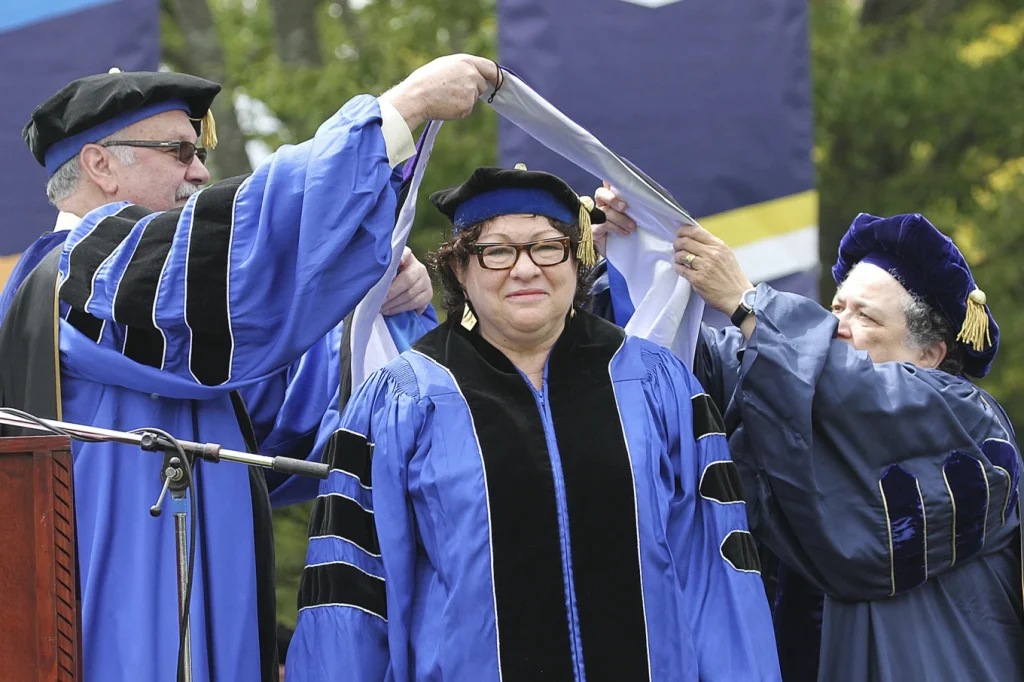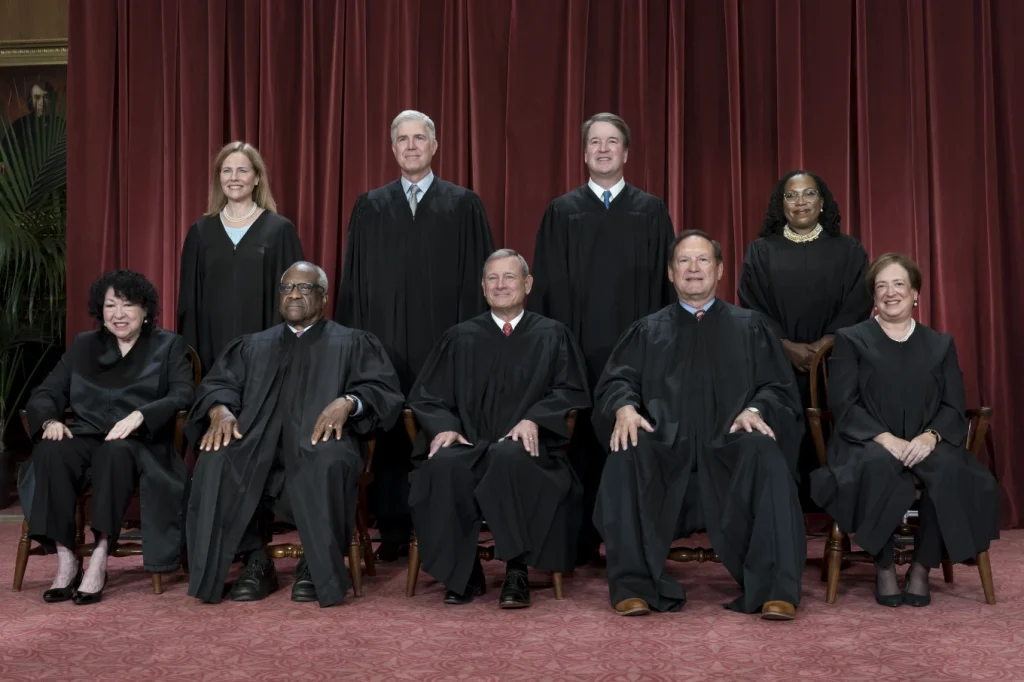In a revealing exploration of the relationship between public colleges and universities and Supreme Court justices, it has come to light that these institutions have been utilizing the visits of justices as a means to generate donations.
This practice was uncovered through the acquisition of thousands of pages of emails and other documents by The Associated Press.
The documents shed light on the meticulous planning that goes into these visits, with school officials strategically crafting guest lists for dinners and events, ensuring the presence of influential donors.
Notably, these donors often have vested interests in industries that have had cases before the court. Such instances include Justice Clarence Thomas’ appearance at McLennan Community College, where a dinner at a wealthy businessman’s home was organized in the hopes of attracting prospective donors and rewarding school patrons.
Similarly, when Justice Elena Kagan visited the University of Colorado’s law school, suggestions were made to increase the ratio of donors to staff members at the accompanying dinner.
Furthermore, when Justice Sonia Sotomayor confirmed her attendance at Clemson University, the institution made a deliberate effort to invite donors who had contributed over $1 million to the college.
These revelations raise questions about the potential influence of wealthy donors on the judicial system and the ethical implications of such practices.
The recently disclosed documents shed light on a disconcerting reality: justices from both ends of the ideological spectrum within the Supreme Court have engaged in partisan activities, leveraging the esteemed status of their positions.

This includes headlining speaking engagements alongside prominent politicians, as well as promoting their own personal interests, such as book sales, during visits to colleges and universities.
Interestingly, these actions would likely be deemed unacceptable if carried out by federal judges serving in lower courts.
However, the Supreme Court’s definition of prohibited fundraising is so narrowly defined that it fails to account for instances where contributors are solicited later, while being reminded of the special access they were granted.
The issue of justices potentially being influenced or having their access sold has raised concerns among legal experts, as highlighted by University of Virginia law professor Amanda Frost.
While she acknowledges that the justices may not be naive about this issue, they have placed themselves in situations where individuals can legitimately assert that they are providing access or using their proximity to the justices to fundraise.
This, according to Frost, poses a significant problem. In response to these concerns, the Supreme Court has stated that they routinely request event organizers to confirm that any event involving a justice as a speaker is not a fundraiser.
They also provide a clear definition of what constitutes a fundraiser to prevent any misunderstandings.
According to a statement released by the Court, they reach out to event organizers to gather additional information when necessary.
This practice has proved valuable, as there have been instances where Justices declined to participate in events despite organizers explicitly stating that they were not fundraisers.
The Court’s thorough inquiry confirmed that these events were indeed fundraisers, leading to the Justices’ decision to abstain.
However, these revelations come at a critical juncture for the court, which, as per its constitutional role, resolves disputes that establish fundamental boundaries in American society.

The court’s integrity is currently being called into question due to concerns surrounding ethics violations by justices and divisive court rulings, such as the highly controversial decision to overturn Roe v. Wade last year.
In fact, a survey conducted in 2022 revealed that trust in the court has reached a 50-year low, with only 18% of respondents expressing a high level of confidence.
At the core of the current inquiries into the court lies the absence of a formal code of conduct, which leaves the justices without a shared set of ethical guidelines.
This lack of a “common reference point” has become a significant concern, as highlighted by retired federal Judge Jeremy Fogel, who was appointed by President Bill Clinton.
The absence of a code of conduct raises questions about how justices navigate their responsibilities and make decisions, further contributing to the erosion of public trust in the court.
As the court faces mounting scrutiny and criticism, it becomes increasingly crucial to address these concerns and establish a clear framework that ensures the highest standards of ethics and impartiality in its operations.
Only through such measures can the court regain the public’s trust and reaffirm its pivotal role in shaping American jurisprudence.
The lack of a comprehensive and agreed-upon set of rules for Supreme Court justices raises significant concerns about the potential erosion of legitimacy and ethical conduct within the judicial system.
According to Fogel, a former agency leader responsible for educating judges on ethics matters, the absence of such guidelines results in a subjective evaluation of whether certain actions are acceptable or not.
This subjective evaluation, when viewed through a political lens, can further exacerbate questions regarding the legitimacy of judicial decisions.
Consequently, this lack of a clear framework poses a genuine problem for the judiciary.
While lower court federal judges are explicitly prohibited from engaging in fundraising, political activity, and leveraging their judicial office for personal gain, Supreme Court justices are only expected to adhere to a set of “ethics principles and practices,” as articulated by Chief Justice John Roberts in a statement endorsed by all nine members of the court.
This disparity in the level of accountability and transparency is evident in the limited disclosure of expenses-paid travel by the justices, with some events not being disclosed at all.
This discrepancy in ethical standards between lower court judges and Supreme Court justices further underscores the need for a comprehensive and uniform set of rules that can foster trust, integrity, and legitimacy within the highest echelons of the judiciary.
The long-standing assumption that the justices of the court have chosen public service over more lucrative opportunities has begun to unravel in recent times.
The court, with its members receiving a substantial salary of $285,400, or even higher for Chief Justice Roberts, has been seen as a bastion of integrity.
However, this perception has been shattered as the media reports this year exposed a series of ethical lapses. Investigations by ProPublica, for instance, revealed that Justice Thomas accepted luxury vacations repeatedly, including a staggering $500,000 trip to Indonesia in 2019, courtesy of Harlan Crow, a billionaire businessman, Republican donor, and a close friend.

Such revelations have sparked calls for the establishment of an ethics code and greater transparency regarding the justices’ travel arrangements.
Recognizing the need to bridge the information gap, the Associated Press initiated over one hundred public records requests to obtain vital details regarding the identities of donors and politicians invited to private receptions, as well as information on perks provided during trips touted as academic in nature.
In addition to scrutinizing public institutions, the AP also approached over one hundred private schools, organizations, and charities where the justices delivered speeches.
However, as these institutions are not subject to public records laws, most of them declined to provide any specific details to the Associated Press.
The need for a greater examination into the travel and activities of Supreme Court justices, therefore, has become increasingly apparent, highlighting the necessity for reforms to promote transparency and accountability within the judiciary.
Justice Sotomayor demonstrated a keen understanding of the potential dangers associated with attending events with donors.
This was evident early on in her tenure on the Supreme Court when she firmly declined an invitation to dine with prominent contributors to the University of Hawaii in 2012. In a communication to school officials, one of her aides explicitly stated that the Justice would not participate in a private dinner at a “club” with Mr. Boas, a generous supporter of the Law School.
The aide cited Canon 2(B) of the Code of Conduct for U.S. Judges, which emphasizes that judges should refrain from utilizing their judicial position to promote their own or others’ personal interests.
It was made clear that Justice Sotomayor meticulously adheres to this guideline, emphasizing her commitment to maintaining the integrity and impartiality of the judiciary.
